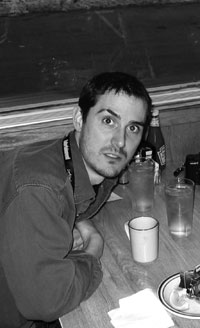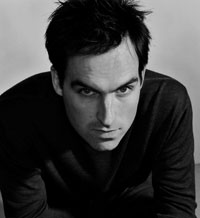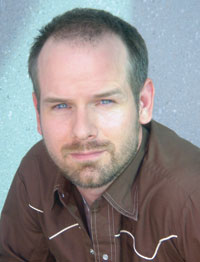25 NEW FACES OF INDEPENDENT FILM 2005
 |
NEAR THE BEGINNING OF JAKE MAHAFFY’S B&W POSTAPOCALYPSE EPIC WAR, AN OFFSCREEN VOICE MURMURS, “This is the world after the end of the world.” The quote refers to the film’s camera trail of poverty and economic devastation, images suggesting a ruined American heartland as shot by Andrei Tarkovsky or Walker Evans. But the quote could just easily apply to Mahaffy’s own brand of independent filmmaking. Over the course of five years, Mahaffy shot War with a hand-cranked silent camera and without a crew. “I started off with a script and a very clear idea of what I wanted to do,” he explains. “But I didn’t have the money to shoot dialogue. So rather than stop I decided to shoot everything except the script. I shot hours and hours of the lives of the characters not in the script. I would just roll film and hope that it would come together in the end.”
The result is a strange, ghostly depiction of lonely characters adrift in a rural wasteland set to a soundtrack of radio broadcasts and pensive narration. War played the Sundance Frontier section in 2004, and since then Mahaffy has continued to mine his singular style, returning to the festival this year with a short, Motion Studies #3: Gravity, part of a series of films “mocking the religion of science by artistically reinterpreting various scientific data.”
Mahaffy, who currently teaches film production and film studies at Hollins University in Roanoke, Va., studied art at the Rhode Island School of Design and credits the school with shaping his philosophy of filmmaking: “The drawing teachers taught me how to see what’s there as opposed to what you think is there. The main thing [about filmmaking for me] is not to make assumptions about what a film is and what a film is supposed to be.” Mahaffy was awarded a Creative Capital grant for his new feature Free in Deed and will develop its screenplay at the 2005 Sundance Screenwriters Lab. Of the movie, Mahaffy says, “It’s about a guy who tried to perform a miracle and failed.” — S.M.
Contact: jake@handcrankedfilm.com, www.handcrankedfilm.com
12 NEIL DELA LLANA & IAN GAMAZON
 |
 |
THE STANDARD ADVICE GIVEN TO MOST PROMISING YOUNG FILMMAKERS IS TO HAVE AS MANY PROJECTS AS POSSIBLE, then see which one sticks. Thirty-three-year-old Victor Buhler has taken this adage to somewhat of an extreme. He spent much of 2004 inside New York’s infamous Riker’s Island, directing a vérité documentary for Showtime called Riker’s High, which would ultimately win the NY/NY prize for Best Documentary Feature at the 2005 Tribeca Film Festival. At the same time, he was developing — and later selling — a TV pilot for Fox called Lone Star, which he describes as “The O.C. in Dallas” and which Doug Liman will direct. All the while he kept plugging away with his feature-length scripts, one of which, Two Harbors, is set up at Universal/Hypnotic.
Born in Singapore and raised in London to American parents, Buhler studied documentary film at NYU’s Tisch grad film program, where his thesis film, Chaperone, won the Martin Scorsese Award and was nominated for a Student Academy Award. “I would say my strength and weakness is my facility to adapt to different situations and material, but it can also be a drawback.” says Buhler. “Wanting it all isn’t a very practical approach, but it ultimately forces its choices upon you. Now it’s exciting not to be classified. Like everyone, I want to be directing features someday, so hopefully this is all leading up to that.” — M.R.
Contact: David Kopple at the Gersh Agency: (310) 205-5888
 |
WRITER, DIRECTOR AND SOMETIME ACTOR DON HANDFIELD’S CAREER HAS BEEN ONE OF SERENDIPITOUS ENCOUNTERS. At Ohio State University he changed his major from theater performance to television broadcasting after being told by a 30-year-old temp worker stuffing envelopes that she’d gotten a degree in theater. While he continued doing theater, he also learned about cameras and editing and, most importantly, how to write. After college he moved to L.A. and became an actor-waiter — that is, until a chance encounter with a woman at E! Channel got him a job at that burgeoning cable network. From there Handfield moved through a series of adventures — writing and producing television, starting up a production company for television commercials, creating programming for the interactive cable channel G4, moving to Hawaii with a girlfriend to write, leaving Hawaii (sans girlfriend) and moving to Puget Sound, Wash., to live with his dad and write a first draft of his feature Hello, My Name Is Jason Scott.
For Handfield the ragged trajectory of his ambition has provided him with a theme. “This thing that I have started to explore in my work,” he explains, “is the idea that sometimes the worst thing that ever happened to you is the best thing that ever happened to you.” From the loneliness of writing in rainy Washington, Handfield moved back to L.A., getting a lot of help from his friends. Tony Bui inspired him to make a short film from his script (with French Stewart playing the title character). Lauren Moews came on board to produce, and then she and Tim and Tony Bui submitted Handfield for the FIND Directors Lab. Being at the labs, Handfield recounts, “led directly to Lions Gate being interested. They read the script that FIND sent out and they saw the scenes that I shot at the lab [with his friend Jeremy Renner playing the lead], and that convinced them I could direct.”
As he waits for producer Moews to clear her slate and for Lions Gate to find high-profile talent, Handfield has been busy writing. He just finished adapting Karl Wagner’s novel series about a fantasy swordsman, has been doing research on baseball for a sports film and has been tapped by Jerry Weintraub Productions to write a comedy, Genius. — Peter Bowen
Contact: Brent Weinstein at UTA: (310) 246-6093, Will Lowery at Underground Management: 323-930-2435
 |
15 MARY JORDAN
UNTIL A FEW YEARS AGO, MARY JORDAN HAD NEVER BEEN CONTENT TO FOCUS ON JUST ONE THING. Over the previous decade she had lived on four continents, owned a vintage clothing business, earned her master’s degree in anthropology from the London School of Economics, started a music video and commercial production company in Australia, directed and/or produced a slew of human-rights docs on subjects ranging from female circumcision to Buddhism, and created and curated the Burmese Tea Ceremony, a recurring international performance-arts event.
And then Jordan found Jack Smith. During a stint living at a commune in San Francisco she met Irving Rosenthal, the seminal editor of Beat-generation writers and a close friend of Smith, the legendary underground artist who has been credited for inventing everything from performance art to the camp aesthetic before his death from AIDS in 1989. “Irving showed me a photo of Jack and I was just blown away,” says Jordan. “I managed to track down a pirated copy of [Smith’s infamous 1963 film] Flaming Creatures on VHS. It was interesting and confusing and beautiful and breathtaking. I was shocked that it wasn’t available to more people, because it was obviously such an important, influential work which was just buried in obscurity. I knew this was a subject that demanded to be told.”
Jordan’s documentary, Jack Smith and the Destruction of Atlantis, combines interviews with many of Smith’s collaborators and admirers along with little-known archival footage of him and his work. Recently she enlisted the help of editor Paul Zucker and hopes to finish the film by the end of the year. “It’s not your normal documentary,” says Jordan. “It’s more of an artwork, a collage, an excavation into an exotic fantasy world of Jack Smith. John Waters once said that Jack did it all first, and that’s what I want to show in this film.” — M.R.
Contact: mj@tonguepress.com
<< Back | Next >> [1-5 | 6-10 | 11-15 | 16-20 | 21-25]
VOD CALENDAR


 See the VOD Calendar →
See the VOD Calendar →


